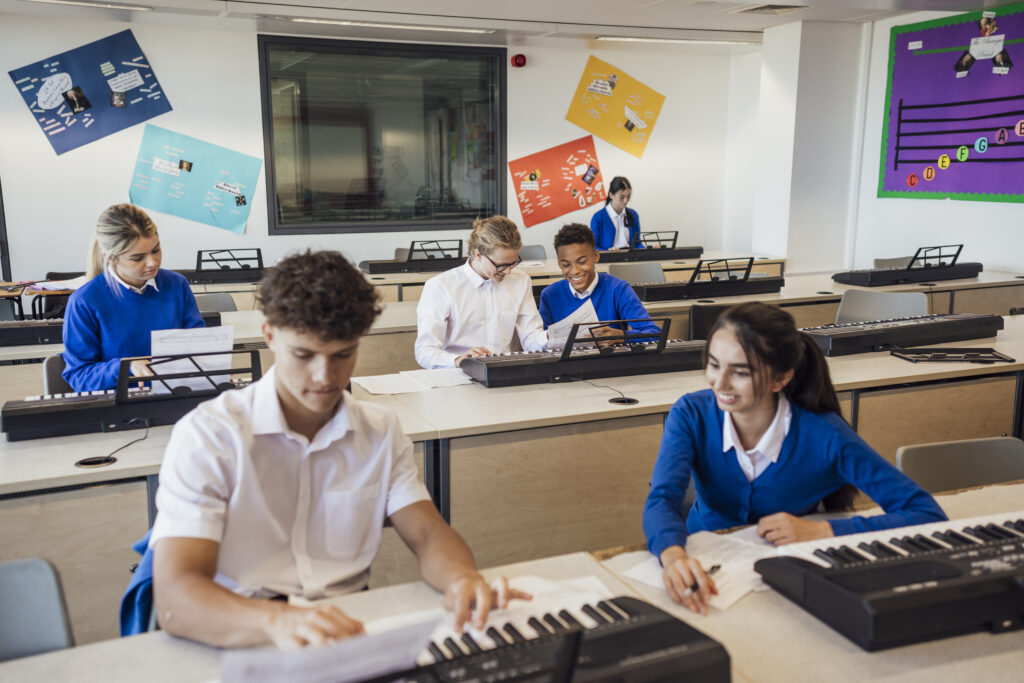Break down barriers to opportunity

How Labour will break down barriers to opportunity:
- Recruit 6,500 new expert teachers in key subjects
- 3,000 new primary school-based nurseries
- Free breakfast clubs in every primary school
- A modern curriculum so young people are ready for work and life
- High-quality apprenticeships and specialist technical colleges
Skip to:
Whoever you are, wherever you come from, Britain should be a country where hard work means you can get on in life. Under the Conservatives, this basic promise – that if you work hard, you will enjoy the rewards – has been broken. We are a country where who your parents are – and how much money they have – too often counts for more than your effort and enterprise. Too many people see success as something that happens to others. This is an appalling waste of talent as well as a huge injustice. So, breaking the pernicious link between background and success will be a defining mission for Labour.
First, we must recognise that greater opportunity requires greater security. Tackling economic insecurity – at work, at home, in our communities and public services – is the golden thread that runs through all of Labour’s missions. On that secure foundation, we can build an education system that prepares our children for life, work, and the future.
Our education system is struggling to cope after years of chronic mismanagement under the Conservatives. Childcare and early education are increasingly unaffordable and unavailable. Too many children arrive at primary school not ready to learn. Too many children are not even getting to school. Teachers are burnt out and leaving in droves. Fewer people are participating in apprenticeships and training. Higher education is in crisis. Meanwhile, too many of our young people leave school unprepared for the future.
Labour will transform our education system so that young people get the opportunities they deserve. We will expand our childcare and early‐years system, drive up standards, modernise the school curriculum, reform assessment, and create higher-quality training and employment paths by empowering local communities to develop the skills people need. We will also put employers at the heart of our skills system.
Every child should believe that success belongs to them. Education has so often been the spark that can light a fire within, transforming life chances. It is time to light that fire for the whole country.
Family security
Good work will be the foundation of our approach to tackling poverty and inequality. We will create more good jobs, reform employment support, and make work pay so that many more people benefit from the dignity and purpose of work.
Labour is committed to reviewing Universal Credit so that it makes work pay and tackles poverty. We want to end mass dependence on emergency food parcels, which is a moral scar on our society.
Child poverty has gone up by 700,000 under the Conservatives, with over four million children now growing up in a low-income family. Last year, a million children experienced destitution. This not only harms children’s lives now, it damages their future prospects, and holds back our economic potential as a country. Labour will develop an ambitious strategy to reduce child poverty. We will work with the voluntary sector, faith organisations, trade unions, business, devolved and local government, and communities to bring about change.
We will take initial steps to confront poverty by introducing free breakfast clubs in every primary school, protecting renters from arbitrary eviction, slashing fuel poverty, banning exploitative zero hours contracts, and improving support to help people get into good work.
Our system of state, private, and workplace pensions provide the basis for security in retirement. Labour will retain the triple lock for the state pension. We will also adopt reforms to workplace pensions to deliver better outcomes for UK savers and pensioners. Our pensions review will consider what further steps are needed to improve security in retirement, as well as to increase productive investment in the UK economy.
Security also means having a secure roof over your head. That is not the case for too many renting their homes privately. Labour will legislate where the Conservatives have failed, overhauling the regulation of the private rented sector. We will immediately abolish Section 21 ‘no fault’ evictions, prevent private renters being exploited and discriminated against, empower them to challenge unreasonable rent increases, and take steps to decisively raise standards, including extending ‘Awaab’s Law’ to the private sector.
Labour will also take decisive action to improve building safety, including through regulation, to ensure we never again see a repeat of the Grenfell fire. We will review how to better protect leaseholders from costs and take steps to accelerate the pace of remediation across the country. We will put a renewed focus on ensuring those responsible for the building safety crisis pay to put it right.
For far too many leaseholders, the reality of home ownership falls woefully short of the dream they were promised. Labour will act where the Conservatives have failed and finally bring the feudal leasehold system to an end. We will enact the package of Law Commission proposals on leasehold enfranchisement, right to manage and commonhold. We will take further steps to ban new leasehold flats and ensure commonhold is the default tenure. We will tackle unregulated and unaffordable ground rent charges. We will act to bring the injustice of ‘fleecehold’ private housing estates and unfair maintenance costs to an end.
The last Labour government made huge strides in ending homelessness. Under the Conservatives, that progress has been undone, with rough sleepers an all-too-common sight in our towns and cities, and a sharp rise in hidden homelessness. Building on the lessons of our past, Labour will develop a new cross-government strategy, working with Mayors and Councils across the country, to put Britain back on track to ending homelessness.
Labour’s first steps: Recruit 6,500 more teachers
Best start in life
High-quality early education and childcare is a crucial opportunity to transform life chances. Too often it is unavailable, or unaffordable.
As an initial step, Labour will open an additional 3,000 nurseries through upgrading space in primary schools, to deliver the extension of government funded hours families are entitled to.
Supporting children in the early part of their life also means giving parents the flexibility they need to care for their children. Labour will review the parental leave system, so it best supports working families, within our first year in government.
Every child should have a loving, secure home. Labour will work with local government to support children in care, including through kinship, foster care, and adoption, as well as strengthening regulation of the children’s social care sector.
Sadly, too often we see families falling through the cracks of public services. Labour will improve data sharing across services, with a single unique identifier, to better support children and families.

Raising school standards
Labour is determined to raise school standards for every child, and ensure they are prepared for the future. Most children attend schools where the Conservatives are failing to provide the support and teaching that they need. Labour will end the VAT exemption and business rates relief for private schools to invest in our state schools.
The factor that makes the biggest difference to a child’s education is high-quality teaching; but there are shortages of qualified teachers across the country. Labour will recruit an additional 6,500 new expert teachers. We will get more teachers into shortage subjects, support areas that face recruitment challenges, and tackle retention issues. The way bursaries are allocated, and the structure of retention payments, will be reviewed.
Teaching is a hard-earned and hard-learned skill, Labour will work to further raise its status. We will update the Early Career Framework, maintaining its grounding in evidence, and ensure any new teacher entering the classroom has, or is working towards, Qualified Teacher Status. We will introduce a new Teacher Training Entitlement to ensure teachers stay up to date on best practice with continuing professional development.
School support staff play a vital role in children’s education and development. Labour will reinstate the School Support Staff Negotiating Body, which will help address the acute recruitment and retention crisis in support roles.
Raising school standards starts with early education. The last Labour government’s promotion of phonics put rocket boosters under the reading and writing ability of a generation of children. We will do the same for numeracy, improving the quality of maths teaching across nurseries and primary schools.
Developing early communication skills is another key foundation for life, with serious knock-on consequences when development is delayed. Labour will fund evidence-based early-language interventions in primary schools, so that every child can find their voice.
Alongside high-quality teaching, driving up standards in education requires outstanding leadership. Labour will create a new Excellence in Leadership Programme, a mentoring framework that expands the capacity of headteachers and leaders to improve their schools. Labour will introduce new Regional Improvement Teams, to enhance school-to-school support, and spread best practice.
Accountability is non-negotiable, which is why Labour supports school inspection. Under the Conservatives our inspection regime has been broken. A system which declares nine in ten schools are good or outstanding fails to provide sufficient information on school performance. We will enhance the inspection regime by replacing a single headline grade with a new report card system telling parents clearly how schools are performing. We will also bring Multi-Academy Trusts into the inspection system and introduce a new annual review of safeguarding, attendance, and off-rolling.
Every child should have a broad curriculum with an excellent foundation in reading, writing and maths, and support to develop essential digital, speaking, and creative skills. Yet today, too many are missing out. Labour will launch an expert-led review of curriculum and assessment, working with school staff, parents and employers to change this.
Our reforms will build on the hard work of teachers who have brought their subjects alive with knowledge-rich syllabuses, to deliver a curriculum which is rich and broad, inclusive, and innovative. To capture this breadth, our review will consider the right balance of assessment methods whilst protecting the important role of examinations.
Too often our education and care systems do not meet the needs of all children, including those with Special Educational Needs and Disabilities (SEND). Labour will take a community-wide approach, improving inclusivity and expertise in mainstream schools, as well as ensuring special schools cater to those with the most complex needs. We will make sure admissions decisions account for the needs of communities and require all schools to co-operate with their local authority on school admissions, SEND inclusion, and place planning.
Too many children’s life chances are being scarred by rising poverty. Too many arrive at school not ready to learn, and too many are absent. Breakfast clubs improve behaviour, attendance, and learning. Labour will fund free breakfast clubs in every primary school, accessible to all children. Our breakfast clubs will support parents through the cost-of-living crisis. We will also bring down the cost of school by limiting the number of branded items of uniform and PE kit that schools can require.
Poor mental health is another barrier to learning. The struggle to access support is paralysing children and young people through their formative years. Labour will provide access to specialist mental health professionals in every school, so every young person has access to early support to address problems before they escalate. This will complement our plan for Young Futures Hubs, which will make sure every community has an open-access hub for children and young people with drop-in mental health support.
“Having been a headteacher, it is my privilege to support Labour’s plans”
Zahida, Trust School Improvement Partner
Reforming further and higher education
After years of Conservative chaos and policy churn, the skills system in England is confusing for young people, adults, and employers. Apprenticeship numbers have plummeted. Skills shortages are widespread. Young people have been left without the opportunities they need. The result is an economy without the necessary skills, nor any plan for the skills needs of the future. Labour will address this by bringing forward a comprehensive strategy for post‐16 education. And we will guarantee training, an apprenticeship, or help to find work for all 18- to 21-year-olds.
We will establish Skills England to bring together business, training providers and unions with national and local government to ensure we have the highly trained workforce needed to deliver Labour’s Industrial Strategy. Skills England will formally work with the Migration Advisory Committee to make sure training in England accounts for the overall needs of the labour market. And we are committed to devolving adult skills funding to Combined Authorities, empowering local leaders to have greater control of skills development in their areas, alongside a greater role in supporting people into work. Skills England will co-ordinate between local areas to ensure everyone can access all the opportunities available.
Labour will transform Further Education colleges into specialist Technical Excellence Colleges. These colleges will work with businesses, trade unions, and local government to provide young people with better job opportunities and the highly trained workforce that local economies need.
Labour will also reform the Conservatives’ broken Apprenticeships Levy. The current rigid rules ignore vital skills and training needed to access apprenticeships. Labour will create a flexible Growth and Skills Levy, with Skills England consulting on eligible courses to ensure qualifications offer value for money.
Labour will continue to support the aspiration of every person who meets the requirements and wants to go to university.
We recognise that UK higher education creates opportunity, is a world-leading sector in our economy, and supports local communities. To better integrate further and higher education, and ensure high-quality teaching, Labour’s post-16 skills strategy will set out the role for different providers, and how students can move between institutions, as well as strengthening regulation. We will act to improve access to universities and raise teaching standards.
The current higher education funding settlement does not work for the taxpayer, universities, staff, or students. Labour will act to create a secure future for higher education and the opportunities it creates across the UK. We will work with universities to deliver for students and our economy.

Access to arts, music and sport
With Labour, the arts and music will no longer be the preserve of a privileged few. Culture is an essential part of supporting children and young people to develop creativity and find their voice. There is huge potential for growth in the creative industries that benefit every corner of the UK.
Labour will implement our creative industries sector plan as part of our Industrial Strategy, creating good jobs and accelerating growth in film, music, gaming, and other creative sectors. We will work constructively with the BBC and our other public service broadcasters so they continue to inform, educate and entertain people, and support the creative economy by commissioning distinctively British content.
Labour will support children to study a creative or vocational subject until they are 16, and ensure accountability measures reflect this. We will get more children active by protecting time for physical education, and supporting the role grassroots clubs play in expanding access to sport.
Labour will improve access to cultural assets by requiring publicly funded national museums and galleries to increase the loans they make from their collections to communities across the country. We will also launch a new National Music Education Network – a one-stop shop with information on courses and classes for parents, teachers and children. Access to music, drama and sport has become difficult and expensive because of ticket touting. Labour will put fans back at the heart of events by introducing new consumer protections on ticket resales.
Labour is committed to making Britain the best place in the world to be a football fan. We will reform football governance to protect football clubs across our communities and to give fans a greater say in the way they are run. We will introduce a Football Governance Bill, which will establish an independent regulator to ensure financial sustainability of football clubs in England. We will never allow a closed league of select clubs to be siphoned off from the English football pyramid.
“I welcome Labour’s proposals set out by Keir Starmer to broaden opportunity and make sure all young people have access to the arts. Opening up access to creativity in our schools is critical, not just so that our children have a better chance at a career in the arts, but because access is what will fuel growth in the creative industries — one of the most important sectors for the future of the economy — creating good jobs in all corners of the country.”
– Imelda Staunton CBE, Actor

Respect and equality for all
Everyone in this country deserves a government that matches their ambition. Labour will ensure no matter whatever your background, you can thrive, and therefore we will enact the socio-economic duty in the Equality Act 2010.
Women’s equality will be at the heart of our missions. Our plan to Make Work Pay will transform the lives of working women, including by strengthening rights to equal pay and protections from maternity and menopause discrimination and sexual harassment. And Labour will take action to reduce the gender pay gap, building on the legacy of Barbara Castle’s Equal Pay Act.
Labour will introduce a landmark Race Equality Act, to enshrine in law the full right to equal pay for Black, Asian, and other ethnic minority people, strengthen protections against dual discrimination and root out other racial inequalities. Labour will also reverse the Conservatives’ decision to downgrade the monitoring of antisemitic and Islamophobic hate.
Labour is committed to championing the rights of disabled people and to the principle of working with them, so that their views and voices will be at the heart of all we do. We will introduce the full right to equal pay for disabled people. Building on gender pay gap reporting, we will introduce disability and ethnicity pay gap reporting for large employers. We will support disabled people to work by improving employment support and access to reasonable adjustments. We will also tackle the Access to Work backlog and make sure people can try out a job without fear of an immediate benefit reassessment if it does not work out.
Delivering opportunities for all means that everyone should be treated with respect and dignity. Labour will protect LGBT+ and disabled people by making all existing strands of hate crime an aggravated offence.
So-called conversion therapy is abuse – there is no other word for it – so Labour will finally deliver a full trans-inclusive ban on conversion practices, while protecting the freedom for people to explore their sexual orientation and gender identity.
We will also modernise, simplify, and reform the intrusive and outdated gender recognition law to a new process. We will remove indignities for trans people who deserve recognition and acceptance; whilst retaining the need for a diagnosis of gender dysphoria from a specialist doctor, enabling access to the healthcare pathway.
Labour is proud of our Equality Act and the rights and protections it affords women; we will continue to support the implementation of its single-sex exceptions.
Labour will stop the chaos, end the failure and division of the last 14 years, and turn the page to ensure everyone can thrive.
Help deliver change to Britain.